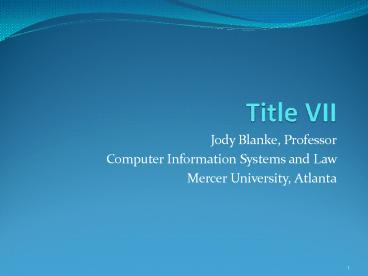Jody Blanke, Professor - PowerPoint PPT Presentation
Title:
Jody Blanke, Professor
Description:
Jody Blanke, Professor Computer Information Systems and Law Mercer University, Atlanta * Title VII It shall be an unlawful employment practice for an employer - to ... – PowerPoint PPT presentation
Number of Views:69
Avg rating:3.0/5.0
Title: Jody Blanke, Professor
1
Title VII
- Jody Blanke, Professor
- Computer Information Systems and Law
- Mercer University, Atlanta
2
Title VII
- It shall be an unlawful employment practice for
an employer - - to fail or refuse to hire or to discharge any
individual, or otherwise to discriminate against
any individual with respect to his compensation,
terms, conditions, or privileges of employment
because of such individuals race, color,
religion, sex, or national origin or - To limit, segregate, or classify his employees or
applicants for employment in any way which would
deprive or tend to deprive any individual of
employment opportunities or otherwise adversely
affect his status as an employee, because of such
individuals race, color, religion, sex, or
national origin. Title VII of the Civil Rights
Act of 1964, as amended, 42 U.S.C.A. sec. 2000e
et seq., sec. 703(a)
3
Title VII
- Prohibits discrimination on the basis of
- Race
- Color
- Gender
- Religion
- National origin
4
Title VII
- For purposes of making decisions regarding
- Hiring
- Firing
- Training
- Discipline
- Compensation
- Benefits
- Classification
- Other terms or conditions of employment
5
Title VII
- Applies to all public (federal, state and local)
and private employers with 15 or more employees - Covers all levels of employees (managerial and
hourly) - Exemption - permits religious institutions and
associations to discriminate when performing
their activities - Petruska v. Gannon University, p.78
6
Filing Claims under Title VII
- Employee files a claim with the EEOC
- EEOC notifies the employer
- Title VII includes antiretaliatory provisions
- Mediation
- EEOC investigation
- No-Reasonable-Cause Finding
- EEOC issues employee a right-to-sue letter
- Exhaustion of administrative remedies
- Reasonable-Cause Finding
- Conciliation
- Civil suit filed in federal district court
7
Filing Claims under Title VII
- In 2007, there were 82,792 charges filed with the
EEOC - 12.2 were settled
- 17.8 were closed
- e.g., failure to pursue claim
- 59.3 resulted in findings of no reasonable cause
- 5.0 resulted in findings of reasonable cause
- the EEOC was successful in 91.5 of its litigation
8
State Agencies
- Many state and local agencies often contract with
the EEOC to become a 706 agency. These
agencies can process EEOC claims. The EEOC will
often defer a complaint to a 706 agency before
investigating the matter itself. - Georgia Fair Employment Practices Act of 1978
protects public employees in Georgia, O.C.G.A
45-19-20 et seq.
9
Theoretical Bases for Title VII Lawsuits
- Disparate Treatment
- Disparate Impact
10
Disparate Treatment
- Employees Prima Facie Case
- Employee is a member of the class of persons
protected by Title VII, - Employee applied for and was qualified for a job
for which the employer was seeking applicants, - That despite these qualifications, employee was
rejected, and - After this rejection, the position remained open
and the employer continued to seek applicants
with those same qualifications.
11
Disparate Treatment
- Employers Defense
- Employer can defend by showing that it had a
legitimate, nondiscriminatory reason for its
decision. - Employees Counter
- Employee must prove that the grounds offered by
the employer were merely a pretext for its
actions and that discrimination was the real
reason. - McDonnell Douglas Corp. v. Green, p. 89
- Black civil rights activist protested after being
laid off and was not rehired when new position
became available. Supreme Court remanded case to
give Green a chance to prove pretext.
12
Disparate Treatment
- Employer may defend by showing that there is a
bona fide occupational qualification (BFOQ) that
is reasonably necessary to the employers
business - Available only in cases involving gender,
religion and national origin (not for race or
color) - The basis for preferring one group over another
goes to the essence of what the employer is in
business to do - Predominant attributes of the group discriminated
against are inconsistent with that business
13
Disparate Treatment
- BFOQ examples
- Airlines and bus companies can have maximum age
requirements - Airlines cannot hire only females as flight
attendants - Wilson v. Southwest Airlines, p. 92
- Playboy can hire only females as Playboy Bunny
servers - Essence of business male entertainment
- Hooters cannot hire only females as Hooters
servers - Essence of business serving spicy chicken wings
14
Disparate Impact
- Discrimination can be established by proving that
an employment practice, although neutral on its
face, disproportionately affects a protected
group in a negative way. - Courts have determined the that the following
screening devices have a disparate impact - Educational requirement race, e.g., Griggs v.
Duke Power, p. 94 - Credit status gender, race
- Arrest record race
- Unwed pregnancy gender, race
- Height and weight requirements gender, national
origin - Marital status gender
- Conviction of crime unrelated to job performance
- race
15
Disparate Impact
- The Four-Fifths Rule is a rule of thumb that
permits a 20 margin between the outcomes of the
majority and the minority under a given screening
device - i.e., disparate impact is statistically
demonstrated when the rate for a protected group
is less than 80 (or four-fifths) of the higher
scoring majority group - Employer can rebut the employees prima facie
case by showing the existence of a business
necessity - e.g., requirement of credit history may result in
fewer women hired, but handling large sums of
money may warrant credit check - Employee would then have to prove that there is a
means of addressing the issue that has less of an
adverse impact






























